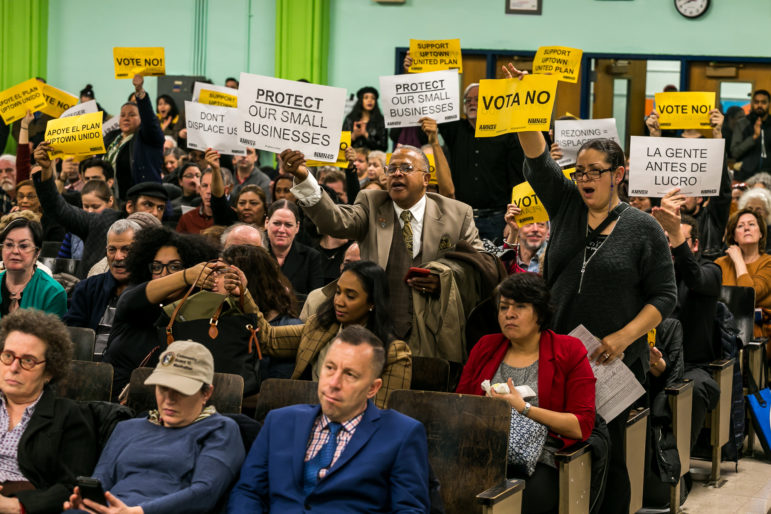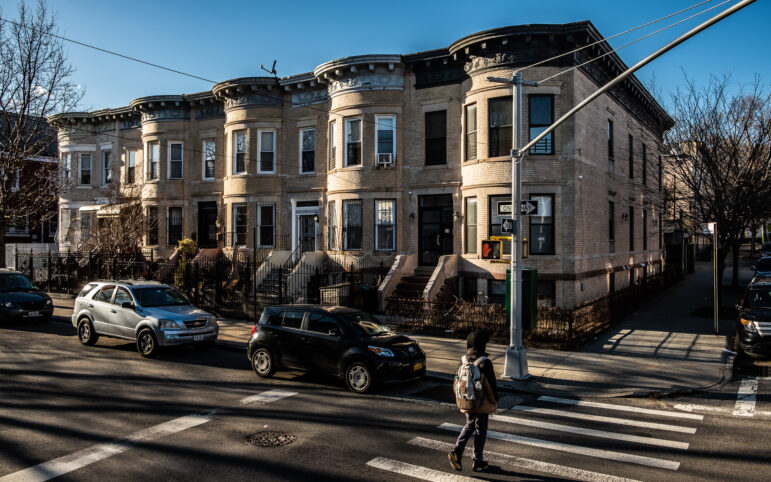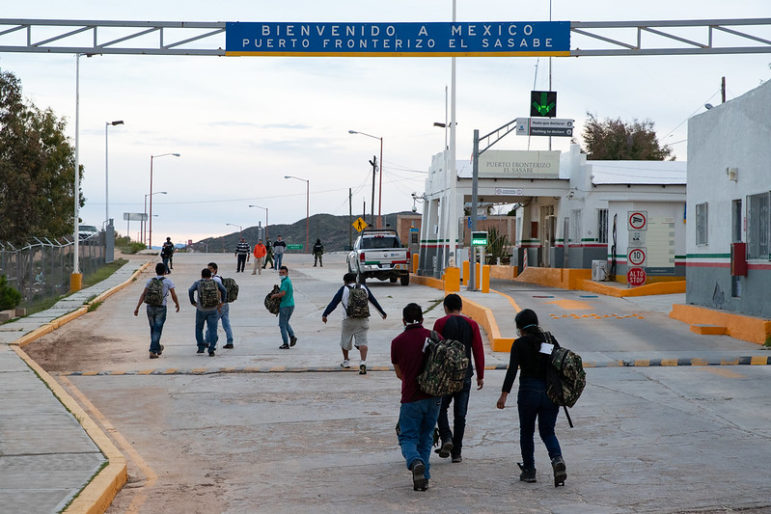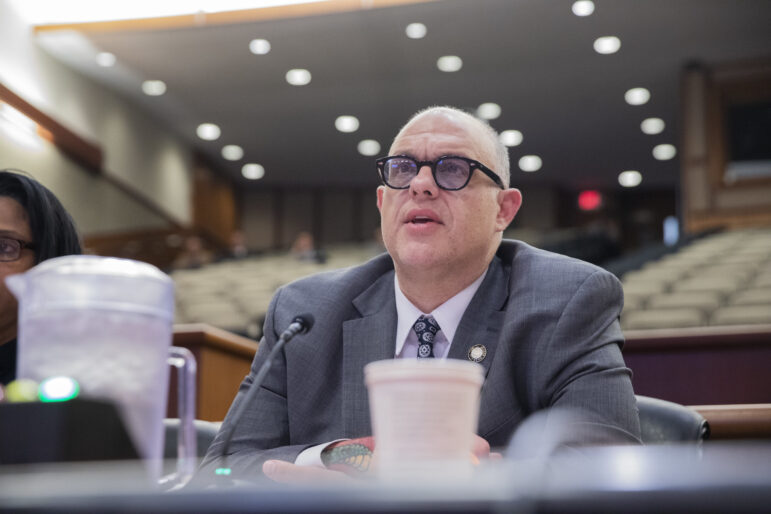The first law signed by President Donald Trump in his second term expands the type of crimes for which noncitizens can be arrested and detained without the option for release on bond—even if they haven’t been convicted of a crime.

Official White House Photo by Shealah Craighead
Former President Donald Trump at a bill signing in 2020.The Laken Riley Act, the first law signed by President Donald Trump in his second term, expanded the type of crimes for which noncitizens can be arrested and detained without the option for release on bond—even if they haven’t been convicted of a crime.
The law doesn’t apply to all categories of immigrants, attorneys explained, and mostly affects undocumented individuals who are in the United States without being admitted or paroled, and those who enter by fraud. It doesn’t apply to green card holders or refugees, or noncitizens who entered the country after being admitted legally.
This federal law is named after a 22-year-old woman who was murdered last year in Georgia by an undocumented man with past arrests. It requires the U.S. Department of Homeland Security (DHS) to issue a detainer and arrest migrants who’ve been charged with, arrested for, convicted of, or admit to having committed a wider range of offenses, which now include “burglary, theft, larceny, shoplifting, or assault of a law enforcement officer offense, or any crime that results in death or serious bodily injury to another person,” reads the law.
Before it was signed into law, DHS warned lawmakers that its implementation would cost an estimated $26.9 billion. Much of the enforcement legwork will have to be done by U.S. Immigration and Customs Enforcement (ICE), which has arrested over 100 immigrant New Yorkers across the city in recent weeks with the participation of the Drug Enforcement Agency.
But many more undocumented immigrants may now find themselves in the crosshairs of federal authorities as a result of accusations or arrests for the specified offenses—even if not convicted, which alarms immigration advocates and attorneys.
“You’ve probably heard the phrase ‘innocent until proven guilty,’ and what this law does is impose very serious consequences on someone for being in the process at the point where they are considered innocent,” explained Lindsay Nash, associate professor of law and co-director of the Immigration Justice Clinic at Cardozo Law School.
“As a legal matter, they have not been proven guilty. They may very well be innocent, and it imposes consequences simply because the person has been accused by law enforcement of something,” she added.
A recent Siena poll of 800 New Yorkers released earlier this month found that 79 percent support the idea of deporting undocumented immigrants with criminal records, while the numbers are split when it comes to deporting immigrants without criminal records: 39 percent support it, and 42 percent don’t.
“This draconian new law compels authorities to detain immigrants based on a mere accusation of a non-violent crime—making it easy for someone to be torn from their family with zero due process,” said Zach Ahmad, senior policy counsel at the New York Civil Liberties Union.
The law expands no-bond detention for migrants, meaning it expands the scope under which someone can be held under mandatory detention across the country.
“Meaning detention by ICE, without any possibility of going before a neutral adjudicator, so that neutral adjudicator can determine if they’re a flight risk or dangerous, that they should be detained,” Nash explained. “It means people are deprived of a chance to show whether, on an individual basis, there’s any basis to keep them in detention.”
Federal immigration law already requires the mandatory detention (without the option for release on bond) of those facing certain criminal or terrorism-related charges, including drug offenses, aggravated felonies, and membership in a terrorist organization.
Karla Ostolaza, managing director for the Bronx Defenders’ immigration practice, said that by including shoplifting and theft among the offenses for which people can be detained without conviction, the new law risks criminalizing poverty.
“I worry a lot about people in the most vulnerable positions, like our clients, who have to steal things to eat, to have some money, [and] to provide for their family,” Ostolaza said. “It’s what we used to call a crime of poverty, which now somehow turns into something that makes you subject to mandatory detention. And people are very eager to deport people over that.”
Attorneys said there are several scenarios under which the law could play out locally.
Ostolaza explained that when migrants with ongoing immigration court cases go for their check-ins at 26 Federal Plaza in Manhattan, officials verify their address, ask if they have broken any laws, and conduct background checks. “If they see that the person has a new arrest, even if it’s something like petty larceny, they get detained right there,” she added.

Adi Talwar
The line outside 26 Federal Plaza one morning in 2015. The building is one of two locations in the city where immigration hearings are held.While the Laken Riley Act does not change New York City’s sanctuary laws, which impose certain restrictions on city agencies cooperating with federal immigration enforcement, attorneys now expect ICE to issue more detainers to the NYPD.
An immigration detainer is a formal written request from ICE that asks a federal, state, or local law enforcement agency to hold a migrant for possible future deportation. One of the main ways people are funneled into the deportation pipeline is through the criminal legal system, lawyers say.
“If someone is arrested criminally, their fingerprints are sent to databases that are shared with various law enforcement agencies, including ICE,” said Sophie Dalsimer, co-director of the Health Justice Program at New York Lawyers for the Public Interest. “And if ICE has reason to believe that that person is removable for any reason, they can issue a detainer to local law enforcement.”
What is not entirely clear is in what cases local agencies will honor ICE’s detainer request if an undocumented person is arrested on one of the new Laken Riley charges.
Currently, the city’s Department of Corrections (DOC) “policy is to cooperate in transferring custody to ICE when ICE requests someone who is ‘a person convicted of a violent or serious crime or identified as a possible match in the terrorist screening database,’” explains the agency’s annual report on ICE detains from fiscal year 2023. That year, DOC received 201 ICE detainer requests and transferred 10 individuals to federal immigration authorities.
When asked, an NYPD spokesman said that under “New York City and New York State law, members of service are not permitted to engage in civil immigration enforcement, assist in any manner with civil immigration enforcement, or allow any Department resources to be used in connection with civil immigration enforcement.”
“At the same time, members of service will not take any action that will interfere with or impede civil immigration enforcement undertaken by federal authorities,” the spokesman added.
Outside the city limits, New York State Police said it “will continue to follow its usual procedures for the investigation and arrest of crimes that violate New York State laws. The Laken Riley Act is a federal law that imposes certain requirements on the federal Department of Homeland Security.”
Advocates, however, fear that the Laken Riley Act threatens to devastate immigrant communities in New York City and state, where officials are waging a battle over how city and state authorities should interact and cooperate with ICE.
This week, Mayor Eric Adams reportedly told his top administration officials not to interfere with immigration enforcement or to criticize the president. On Tuesday, the Justice Department ordered federal prosecutors to drop their corruption and bribery case against the mayor, saying the indictment interferes with Adams’ ability to cooperate with Trump’s immigration enforcement efforts, according to the New York Times.
For years state legislators have introduced a bill called New York for All, which would
prohibit all state and local law enforcement from cooperating with ICE enforcement or holding people on detainers, but it hasn’t passed. The Laken Riley Act adds new urgency, its supporters say.
“New York lawmakers must recognize the dangers of this new law and pass New York For All immediately,” said Ahmad.
To reach the reporter behind this story, contact Daniel@citylimits.org. To reach the editor, contact Jeanmarie@citylimits.org
Want to republish this story? Find City Limits’ reprint policy here.








